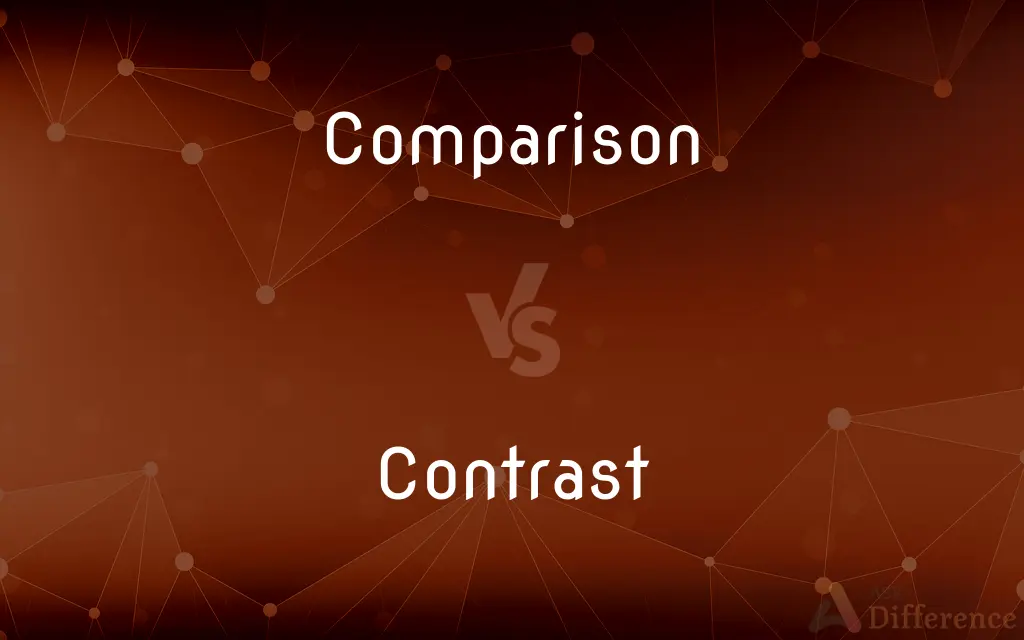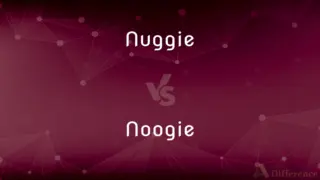Comparison vs. Contrast — What's the Difference?
By Tayyaba Rehman & Urooj Arif — Updated on April 14, 2024
Comparison involves examining similarities and differences between entities, whereas contrast specifically focuses on differences.

Difference Between Comparison and Contrast
Table of Contents
ADVERTISEMENT
Key Differences
Comparison is a broad analytical method used to identify both similarities and differences between two or more items. Contrast, on the other hand, is a technique that specifically highlights only the differences.
In academic writing, comparison is employed to show a more complete understanding of subjects by discussing how they are alike and how they differ. Whereas contrast is used to clearly delineate how two subjects differ, often to support a specific argument or point.
A comparison may lead to a balanced discussion where both similarities and differences are given equal weight. In contrast, focusing solely on differences might provide a more pointed analysis of why things are not alike.
Teachers might ask students to write a comparison essay to explore multiple aspects of subjects, encouraging a deeper understanding. Conversely, a contrast essay would be assigned to sharpen the students’ abilities to distinguish and articulate distinct characteristics.
When used in speeches or presentations, comparison allows for a nuanced view, showing complexity and depth, whereas contrast might be used to persuade or convince an audience by clearly defining opposing sides.
ADVERTISEMENT
Comparison Chart
Focus
Both similarities and differences
Only differences
Purpose
To provide a balanced view or comprehensive analysis
To emphasize distinctions and support specific viewpoints
Usage in writing
Common in expository, analytical, and argumentative writing
Predominantly used in argumentative and persuasive writing
Impact on reader
Encourages a broader understanding of the subjects
Sharpens focus on discrepancies, leading to clearer differentiation
Typical assignments
Comparison essays, balanced reports
Contrast essays, critique papers
Compare with Definitions
Comparison
The act of paralleling two or more objects to derive a conclusion.
Through comparison, one can see that classical music and jazz have both unique and shared rhythmic elements.
Contrast
A literary device used to vividly showcase differences.
The novelist used contrast to bring out the personalities of her protagonists.
Comparison
The act of evaluating two or more items to discover their similarities and differences.
A comparison of apples and oranges involves both their taste and nutritional value.
Contrast
To set in opposition in order to show or emphasize differences.
The essay contrasted the economic outcomes of the two countries.
Comparison
A relative measure or standard.
In comparison to last year's data, this year's results show significant improvement.
Contrast
The state of being strikingly different from something else in juxtaposition.
The contrast between the bright, young stars and the ancient galaxies is fascinating.
Comparison
A study that denotes how items are alike and unlike.
Her comparison of different ancient civilizations highlighted varied cultural practices.
Contrast
In art, the difference in color or lighting that makes objects distinguishable.
The artist used strong contrast in his paintings to highlight emotional turmoil.
Comparison
A rhetorical or literary device that explores the relationship between two entities.
His speech used a comparison of historical and modern leadership styles.
Contrast
An opposition or dissimilarity used for effect.
The quiet, peaceful village was a stark contrast to the bustling city he was used to.
Comparison
The act of comparing or the process of being compared.
Contrast
To set in opposition in order to show or emphasize differences
An essay that contrasts city and country life.
Contrasted this computer with inferior models.
Comparison
A statement or estimate of similarities and differences.
Contrast
To show differences when compared
Siblings who contrast sharply in interests and abilities.
A color that contrasted clearly with the dark background.
Comparison
The quality of being similar or equivalent; likeness
No comparison between the two books.
Contrast
(Linguistics) To evince a difference that can distinguish meaning
Voiced and voiceless stops contrast in English but not in Cree.
Comparison
(Grammar) The modification or inflection of an adjective or adverb to denote the positive, comparative, and superlative degrees, as in English, along with the equative degree in certain other languages, such as Irish Gaelic.
Contrast
The act of contrasting; a setting off of dissimilar entities or objects.
Comparison
The act of comparing or the state or process of being compared.
To bring a thing into comparison with another;
There is no comparison between them
Contrast
The state of being contrasted
Red berries standing in vivid contrast against the snow.
Comparison
An evaluation of the similarities and differences of one or more things relative to some other or each other.
He made a careful comparison of the available products before buying anything.
Contrast
A difference, especially a strong dissimilarity, between entities or objects compared
The contrast between Northern and Southern speech patterns.
Comparison
With a negation, the state of being similar or alike.
There really is no comparison between the performance of today's computers and those of a decade ago.
Contrast
One thing that is strikingly dissimilar to another
My new school was a welcome contrast to the one before.
Comparison
(grammar) A feature in the morphology or syntax of some languages whereby adjectives and adverbs are inflected to indicate the relative degree of the property they define exhibited by the word or phrase they modify or describe.
In English, adjectives and adverbs have three forms when making a comparison: the plain form "hot", the comparative form "hotter", and the superlative form "hottest".
Contrast
The use of opposing elements, such as colors, forms, or lines, in proximity to produce an intensified effect in a work of art.
Comparison
That to which, or with which, a thing is compared, as being equal or like; illustration; similitude.
Contrast
The difference in brightness between the light and dark areas of a picture, such as a photograph or video image.
Comparison
(rhetoric) A simile.
Contrast
(Linguistics) A difference between units, especially one that distinguishes meaning.
Comparison
(phrenology) The faculty of the reflective group which is supposed to perceive resemblances and contrasts.
Contrast
(countable) A difference in lightness, brightness and/or hue between two colours that makes them more or less distinguishable.
Comparison
The act of comparing; an examination of two or more objects with the view of discovering the resemblances or differences; relative estimate.
As sharp legal practitioners, no class of human beings can bear comparison with them.
The miracles of our Lord and those of the Old Testament afford many interesting points of comparison.
Contrast
(uncountable) The degree of this difference.
The red and the orange don't have much contrast between them — I can hardly tell them apart.
Comparison
The state of being compared; a relative estimate; also, a state, quality, or relation, admitting of being compared; as, to bring a thing into comparison with another; there is no comparison between them.
Contrast
(countable) A control on a television, etc, that adjusts the amount of contrast in the images being displayed.
Comparison
That to which, or with which, a thing is compared, as being equal or like; illustration; similitude.
Whereto shall we liken the kingdom of God? Or with what comparison shall we compare it?
Contrast
(countable) A difference between two objects, people or concepts.
Israel is a country of many contrasts.
Comparison
The modification, by inflection or otherwise, which the adjective and adverb undergo to denote degrees of quality or quantity; as, little, less, least, are examples of comparison.
Contrast
(countable) Something that is opposite of or strikingly different from something else.
Comparison
A figure by which one person or thing is compared to another, or the two are considered with regard to some property or quality, which is common to them both; e.g., the lake sparkled like a jewel.
Contrast
Antithesis.
Comparison
The faculty of the reflective group which is supposed to perceive resemblances and contrasts.
Contrast
(transitive) To set in opposition in order to show the difference or differences between.
Comparison
To compare.
Contrast
(intransitive) To form a contrast.
Foreground and background strongly contrast.
Comparison
Examining resemblances or differences
Contrast
To stand in opposition; to exhibit difference, unlikeness, or opposition of qualities.
The joints which divide the sandstone contrast finely with the divisional planes which separate the basalt into pillars.
Comparison
Relation based on similarities and differences
Contrast
To set in opposition, or over against, in order to show the differences between, or the comparative excellences and defects of; to compare by difference or contrariety of qualities; as, to contrast the present with the past.
Comparison
Qualities that are comparable;
No comparison between the two books
Beyond compare
Contrast
To give greater effect to, as to a figure or other object, by putting it in some relation of opposition to another figure or object.
The figures of the groups must not be all on side . . . but must contrast each other by their several position.
Contrast
The act of contrasting, or the state of being contrasted; comparison by contrariety of qualities.
Place the prospect of the soulIn sober contrast with reality.
Contrast
Opposition or dissimilitude of things or qualities; unlikeness, esp. as shown by juxtaposition or comparison.
The contrasts and resemblances of the seasons.
Contrast
The opposition of varied forms, colors, etc., which by such juxtaposition more vividly express each other's peculiarities.
Contrast
The opposition or dissimilarity of things that are compared;
In contrast to
By contrast
Contrast
The act of distinguishing by comparing differences
Contrast
A conceptual separation or demarcation;
There is a narrow line between sanity and insanity
Contrast
The perceptual effect of the juxtaposition of very different colors
Contrast
The range of optical density and tone on a photographic negative or print (or the extent to which adjacent areas on a television screen differ in brightness)
Contrast
Put in opposition to show or emphasize differences;
The middle school teacher contrasted her best student's work with that of her weakest student
Contrast
To show differences when compared; be different;
The students contrast considerably in their artistic abilities
Common Curiosities
What is the main purpose of using comparison?
The main purpose of using comparison is to analyze and understand subjects by examining their similarities and differences.
Why might a teacher choose a comparison essay over a contrast essay?
A teacher might choose a comparison essay to encourage students to think more deeply about the subjects by exploring them comprehensively, including both similarities and differences.
How does contrast enhance understanding?
Contrast enhances understanding by clearly delineating differences, which can emphasize distinctive characteristics or support an argument.
Can comparison be used in scientific studies?
Yes, comparison is often used in scientific studies to draw conclusions from observed similarities and differences among variables.
What types of writing benefit most from contrast?
Types of writing that benefit most from contrast include persuasive and critical essays, where clear differentiation is crucial.
Is it necessary to always use both comparison and contrast together?
It is not necessary to always use both; the choice depends on the writer's or speaker's objectives—whether they aim to highlight differences alone or to provide a full spectrum analysis.
What is the visual impact of contrast in art?
The visual impact of contrast in art lies in its ability to make certain elements stand out, enhancing the overall artistic expression.
How do comparison and contrast contribute to debate?
In debates, comparison can show a well-rounded understanding of the topics, while contrast can be used to strengthen one's argument by highlighting differences.
What makes a contrast effective in speech?
A contrast is effective in speech when it sharply defines opposing viewpoints, helping to clarify the speaker's position and persuade the audience.
How do comparison and contrast differ in their use in literature?
In literature, comparison might be used to draw parallels and explore themes, whereas contrast is often used to create tension or highlight conflicts.
Share Your Discovery

Previous Comparison
Nuggie vs. Noogie
Next Comparison
Banquet vs. CateringAuthor Spotlight
Written by
Tayyaba RehmanTayyaba Rehman is a distinguished writer, currently serving as a primary contributor to askdifference.com. As a researcher in semantics and etymology, Tayyaba's passion for the complexity of languages and their distinctions has found a perfect home on the platform. Tayyaba delves into the intricacies of language, distinguishing between commonly confused words and phrases, thereby providing clarity for readers worldwide.
Co-written by
Urooj ArifUrooj is a skilled content writer at Ask Difference, known for her exceptional ability to simplify complex topics into engaging and informative content. With a passion for research and a flair for clear, concise writing, she consistently delivers articles that resonate with our diverse audience.













































